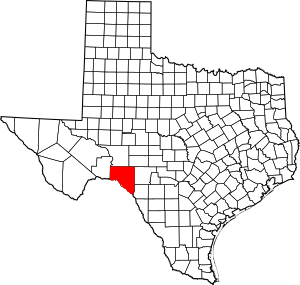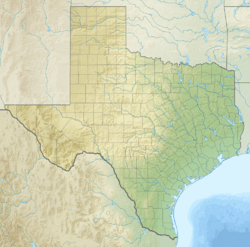Juno, Texas facts for kids
Quick facts for kids
Juno, Texas
|
|
|---|---|
|
Unincorporated Community
|
|
 |
|
| Country | United States |
| State | Texas |
| County | Val Verde |
| Elevation | 1,706 ft (520 m) |
| Time zone | UTC-6 (Central (CST)) |
| • Summer (DST) | UTC-5 (CDT) |
| ZIP codes |
78840
|
| Area code | 432 |
| GNIS feature ID | 1378509 |
Juno was a tiny unincorporated community in Val Verde County, Texas. It was located in the southwestern part of the United States. The last business in Juno closed in 1984. Today, only a ranch remains where the village once stood. This land is now private.
Contents
Where Was Juno?
In the year 2000, only 10 people lived in Juno. The community was located in Val Verde County. This county is right next to the border with Mexico. Juno was about 48 miles north of a city called Del Rio.
Juno's History
How Juno Got Its Name
There's a fun story about how Juno got its name. A man named Henry Stein ran a restaurant in the town. He supposedly only served beans, which are called frijoles in Spanish. When people asked what was on the menu, he would say "you know." This sounded like "Juno." This name stuck and became the official name for the town's post office in the late 1880s.
Important Dates for Juno
- 1849: Soldiers were stationed near Beaver Lake. They helped protect travelers from Native American groups.
- 1880s: The community started as a place for ranchers to get supplies. The post office also opened around this time.
- 1899: Fifty building lots were planned out for the town.
- 1901: Juno had schools in the same building, but they were separated by race. There were two teachers and over 115 students. A hotel also opened, and a stagecoach line served the town.
- 1975: The post office in Juno closed down.
- 1984: The very last business in Juno shut its doors.
More Facts About Juno's Past
The Edmondson family built the first general store in Juno. Henry Stein's cafe, with its "you know" answer, gave the town its unique name. A hotel and a land office opened in the early 1900s. The community also had telephone service and stagecoach rides. The Cadena family ran the blacksmith shop. George Deaton was the person who drove the stagecoach.
At its busiest in 1964, Juno had 80 people living there. For most years from 1931 until 1984, the town only had one business.
Education in Juno
The Juno Common School District was a one room school house. It operated until 1992. Then, it joined with the Comstock Independent School District. The entire Val Verde County area is served by Southwest Texas Junior College. This is according to the Texas Education Code.
 | James B. Knighten |
 | Azellia White |
 | Willa Brown |


